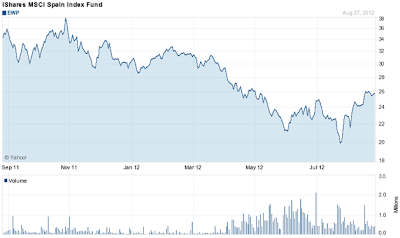INTERNATIONAL MARKETS: A Trojan Horse for Europe & Asia
 Our founder earned clients a 23% average annual return over five years as a stock analyst on Wall Street. "The Greek" has written for institutional newsletters, Businessweek, Real Money, Seeking Alpha and others, while also appearing across TV and radio. While writing for Wall Street Greek, Mr. Kaminis presciently warned of the financial crisis.
Our founder earned clients a 23% average annual return over five years as a stock analyst on Wall Street. "The Greek" has written for institutional newsletters, Businessweek, Real Money, Seeking Alpha and others, while also appearing across TV and radio. While writing for Wall Street Greek, Mr. Kaminis presciently warned of the financial crisis.
International Markets
EUROPE
|
9:54 AM ET
|
ASIA/PACIFIC
|
CLOSE
|
EURO STOXX 50
|
+0.4%
|
NIKKEI 225
|
-2.5%
|
FTSE 100
|
-0.1%
|
Hang Seng
|
-0.5%
|
CAC 40
|
+0.4%
|
S&P/ASX 200
|
-0.8%
|
German DAX
|
+0.2%
|
Korean KOSPI
|
NA
|
Athens ASE
|
+3.7%
|
BSE India SENSEX
|
-0.7%
|
ASIA Today
Markets are closed today in China and Korea for the celebration of the Lunar New Year – The Year of the Horse. Markets will be shut until February 7 in China and until the end of the week in South Korea for the celebration.
ASIAN MARKET ETFs
|
Today
|
iShares MSCI Japan (NYSE: EWJ)
|
-0.34%
|
SPDR S&P China (NYSE: GXC)
|
+0.91%
|
iShares MSCI Australia (NYSE: EWA)
|
+1.35%
|
iShares MSCI S. Korea (NYSE: EWY)
|
+0.97%
|
iShares S&P India (Nasdaq: INDY)
|
+1.91%
|
Asian stocks mostly fell on the day after the U.S. Federal Reserve pushed forward with its asset purchase tapering effort. Global investors are worried that the U.S. consumption economy could falter without the Fed’s extra efforts, after previous signs of such faltering. Basically, Asia just followed the lead of American shares, which dropped precipitously on Wednesday. Even as Asia develops its economies, U.S. and Europe continue to represent important sources of life for Asian business. Emerging markets have been in turmoil since the weak manufacturing report from China, which remains unsettling and unresolved.
The NIKKEI 225 was stripped bare as it fell 2.5% on the day. Japan is having its worst month in nearly two years. Shares of Toyota (NYSE: TM) and Honda (NYSE: HMC) are down about 0.3% each this morning in U.S. trading. However, American traded ETFs are up for most of Asia this morning, reflecting what is likely to occur in Asian trade Friday. The SPDR S&P 500 (NYSE: SPY) is bouncing back today on a solid GDP report and on strong earnings from Facebook (NYSE: FB) and others.
EUROPE Today
Look at those volatile Greek shares, as the Global X FTSE (NYSE: GREK) soars 2.8% after a very rough recent period. Greece is of course Turkey’s neighbor and deemed more closely tied to the Turkish economic turmoil than other euro-trash brothers. The Athens Stock Market Index (ASE) is higher by 3.7% at this hour, but the other indexes we follow here are relatively unchanged.
EUROPEAN ETFs
|
Today
|
Vanguard FTSE Europe (NYSE: VGK)
|
+0.04%
|
iShares MSCI U.K. (NYSE: EWU)
|
+0.12%
|
iShares MSCI France (NYSE: EWQ)
|
-0.07%
|
iShares MSCI Germany (NYSE: EWG)
|
+0.18%
|
Global X FTSE Greece (NYSE: GREK)
|
+2.79%
|
Still, European ETFs started the U.S. trading day much higher than they are trading at this hour, as the Vanguard FTSE Europe ETF (NYSE: VGK) chart shows. If we looked back before the U.S. market open and the good news about GDP, though, we would find a hump at around 8:30 AM ET. Europe started the day lower, similarly following the path of Asian shares on the U.S. Fed decision and American stock decline yesterday.
Europe is still unnerved by Turkish and other emerging market issues. Turkey’s Borsa Istanbul 100 Index marked a 1.0% gain on the day, and the iShares MSCI Turkey (NYSE: TUR) is up 2.3% in U.S. trading after the Turkish central bank acted aggressively.
Spanish & German Data
In other news, Spain’s GDP grew 0.3% in the fourth quarter, as expected, but some estimates show the Spanish economy is growing faster in the shadows. The black market is now estimated to be roughly 25% of total economic activity, as distrust of government and distaste of taxes results from tough times. The iShares MSCI Spain (NYSE: EWP) was up 0.9% near noon in US trading.
German unemployment declined more than forecast in January. The number of unemployed declined by 28K in January, better than the 5K predicted, to 2.93 million. The unemployment rate stuck at 6.8% after adjustment to the December rate, where it marks the lowest rate in two decades. Shares of major German corporation, Siemens (NYSE: SI), were still down by 0.8% on the day.
The Year of the Horse is here. Let’s hope it doesn’t open and offer up a sour surprise.
Please see our disclosures at the Wall Street Greek website and author bio pages found there. This article and website in no way offers or represents financial or investment advice. Information is provided for entertainment purposes only.

Labels: International_Markets, International_Trade, International-Markets-2014-Q1, International-Trade-2014-Q1








































